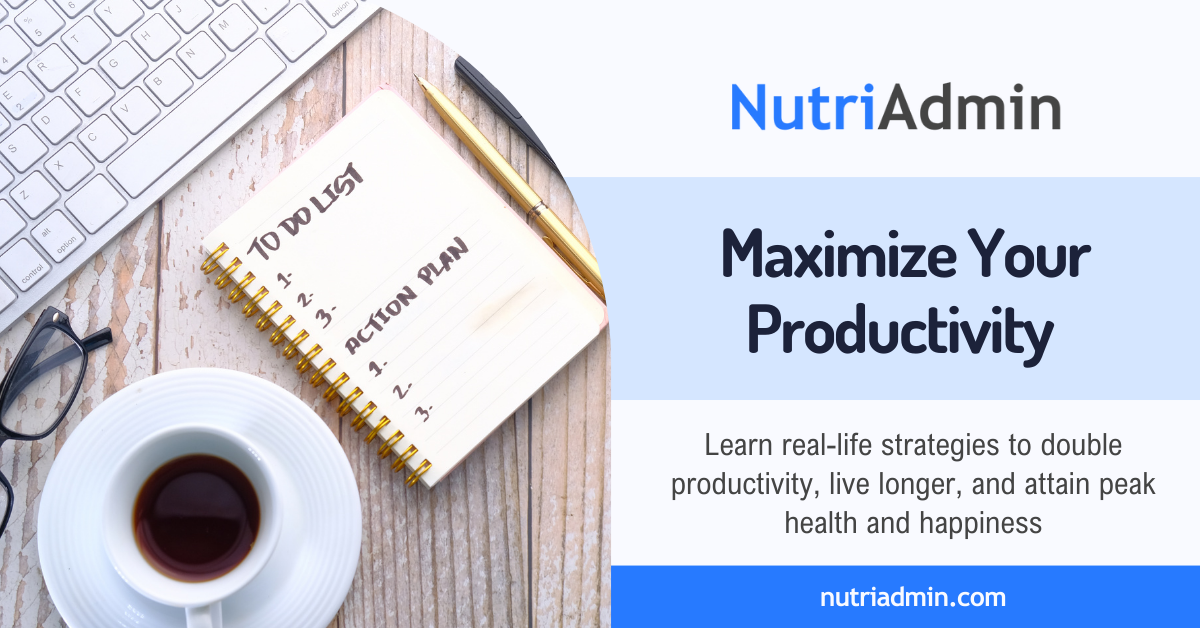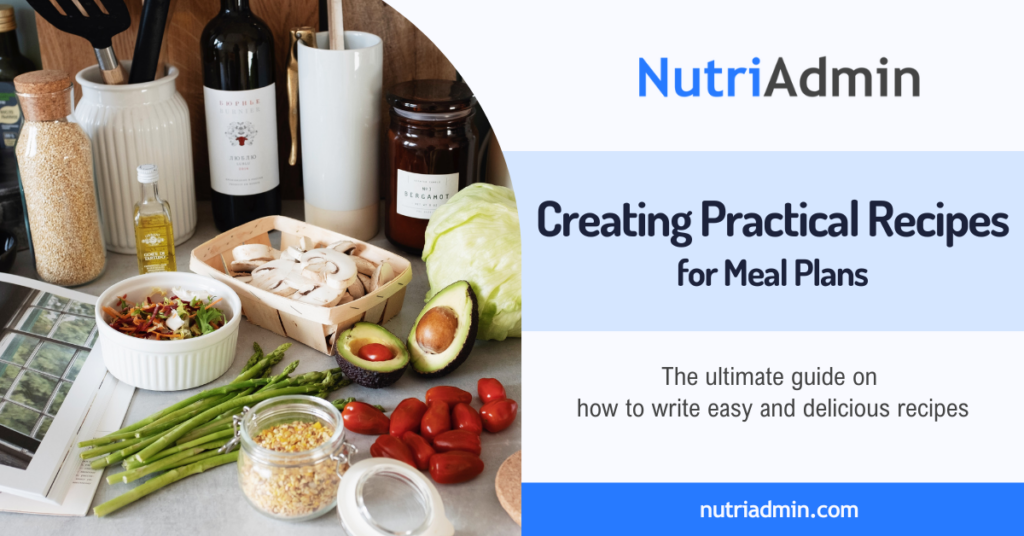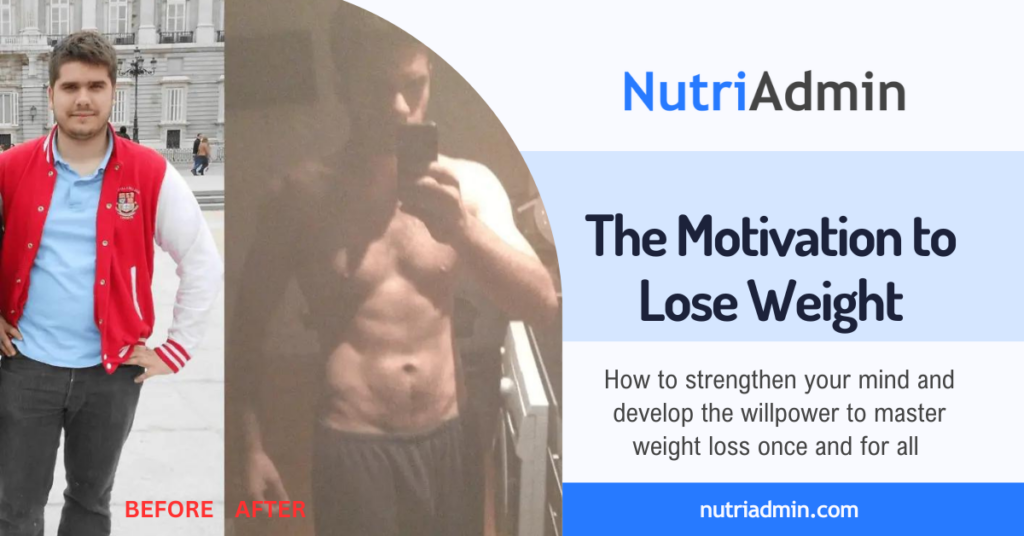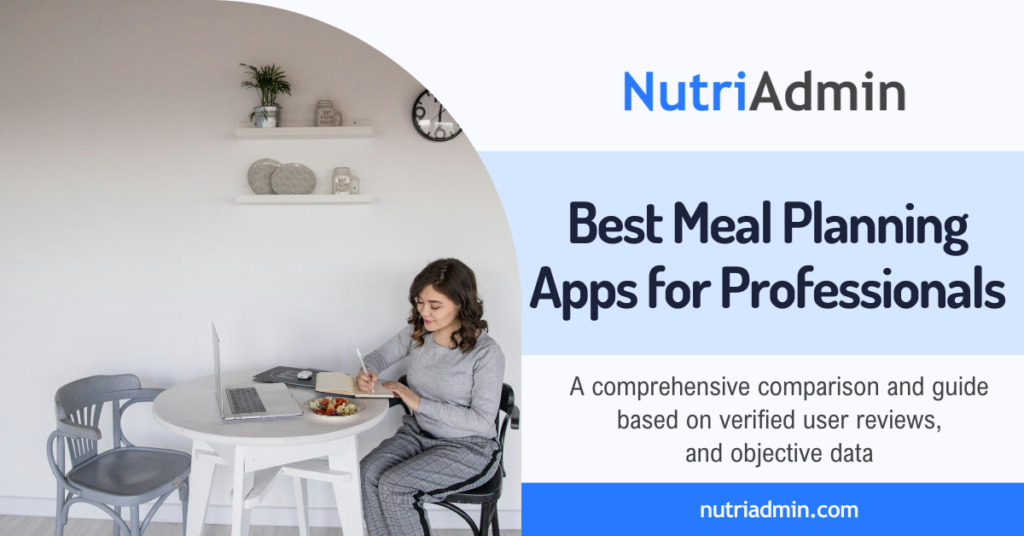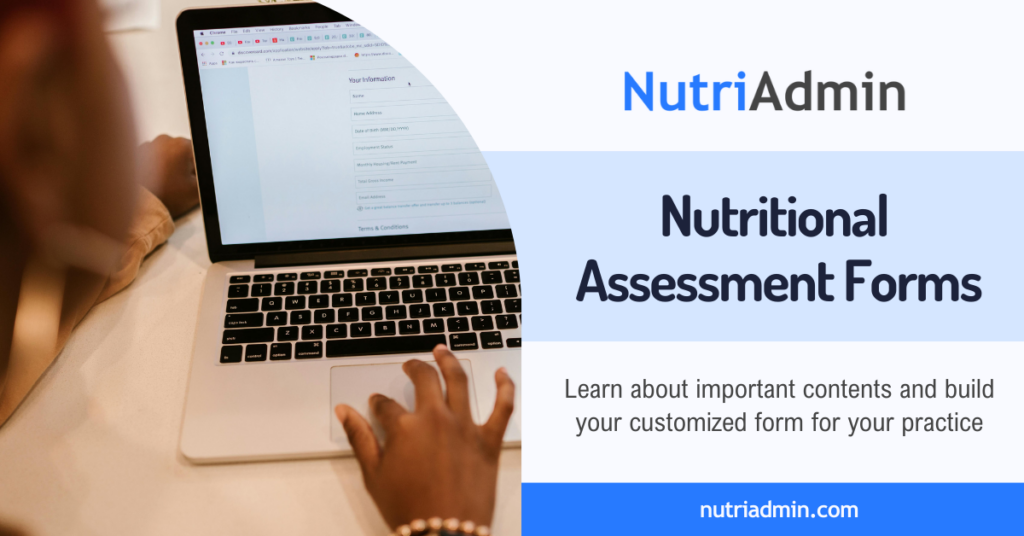My real-life biohacking guide to doubling productivity, living longer, and enjoying top health and happiness
My name is Diego. I have been running my startup nutriadmin.com since 2016. I’ve also graduated from Cambridge University at the top of my class. I am 30, and I have found a set of habits that have made me a productivity machine.
You may be saying: This is the typical overachiever sharing his own experiences… How is this different? The difference is I have nothing to sell in this article. This is a distillation of habits that work for me. Some will work for you too.
So, why is productivity crucial for me? In a normal day I do programming, write articles, talk to customers, do marketing, accounting, managing, and more. No day is the same, and the list of things I have to do is endless.
Given the demands of my work, I have always been interested in productivity and in ways of getting more done in less time. Moreover, I want to enjoy optimal health and happiness. I want to live a remarkable life.
Where do my productivity habits come from
How was this collection of habits assembled? I have a background in Physics, so my approach has been to apply the scientific method, via trial and error, to see what works and what doesn’t for me personally.
Over the years, I have perfected a morning/evening routine, as well as a variety of habits that have significantly improved my health, happiness, and productivity at work.
How do I know these habits work? I measure my productivity and have noticed a massive increase (as much as double) over time. I also keep six-pack levels of body fat year round and have boundless energy and enthusiasm.
Can you relate to having too much to do and not enough time to get it done? Curious to learn more? Want better health? Read on!
My morning and evening routines for productivity
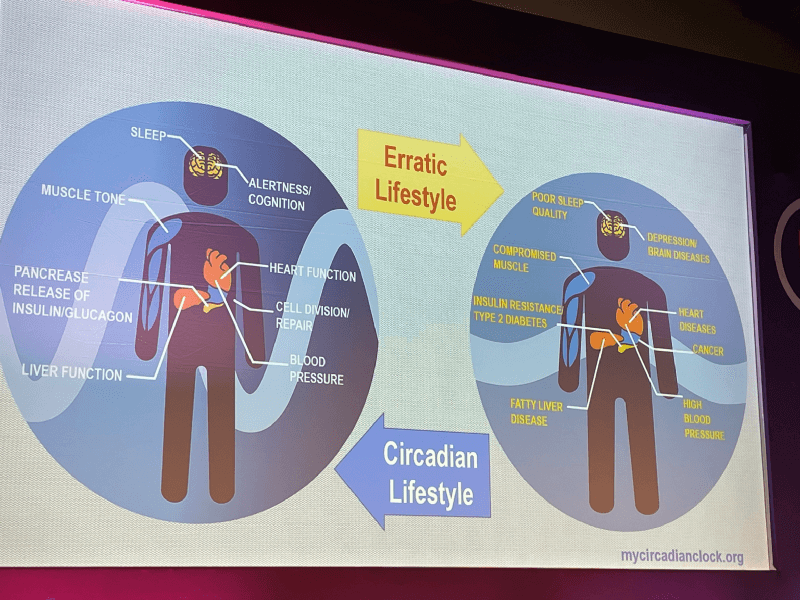
If you just want the gist of my habits, here they are. Rationale and details follow in the next section.
Morning routine
Here is how I currently start my day, every day:
- I wake up at 5AM
- I write down my goals in a leather notepad I keep by my bed
- I drink a large glass of cold water
- I do 10 minutes of body-weight exercises (e.g. squats, press ups, etc)
- I do 10 minutes of yoga
- I do 10 minutes of mindfulness meditation
- I write down what I am grateful for in a notebook
- I have a cold shower
- Only after all of this I allow myself to eat breakfast or check my phone
Evening routine
Every evening, I end the day like this, every day:
- I have my last meal by 5PM
- I get in some exercise, or at least a walk whilst listening to an audiobook
- An hour before bed, I dim the lights and stop using screens
- I am in bed by 8:30PM, if not earlier
- I spend time with my partner or read fiction before sleeping
- I write down my goals again right before switching the lights off
I have built this routine and habits over many years. For instance, I’ve written my goals daily for 8 years. I’ve been exercising for many years too.
Other habits are more recent additions. For instance, I have started waking up at 5AM just 3 months ago, and have sticked to it because the positive effects have been enormous!
Other habits
Other daily habits and rules that I have set up for myself include:
- I don’t play videogames
- I rarely watch TV, and I limit shows to maximum 1 hour a day
- I don’t eat processed food
- I eat as many organic meals as I can
- I only use social media for my business. I don’t have personal social media
- I don’t watch Youtube
- I only use my smartphone for work and for practical purposes
- I don’t have notifications enabled in any of my devices
- I read daily (about a book a week), mainly via audiobooks
- I don’t drink alcohol, or smoke, or take drugs
- I only wear cotton, wool, leather, and other natural materials
- I eat within a compressed window between 6AM and 5PM
- I don’t consume caffeine*
*Regarding caffeine, I have been off from caffeine for a year, but I have recently started experimenting having a single espresso a day early in the morning. More info on this below.
Why so many rules and habits?
I am really healthy as of this day, and you could say everything is going well for me. At least, I feel very fortunate with the life I am living. I attribute my success to my habits. This being said, things haven’t always gone my way.
For instance, when I was 17 and joined university, I quickly gained 35Kg due to a poor junk food diet. I got as high as 110Kg (243 lbs) with my 178cm (5′ 10’’) height. At this high weight my BMI was above the 25-point mark for obesity. You can read how I found the motivation to lose weight in my related in-depth guide.
At the time, I was focusing all my energy in studying. Growing up, we were quite poor — using second-hand clothes, receiving donations from food banks, etc. — so university was my ticket to a better life.
Fun fact, I am the first person in my nuclear family to finish high school. I am also the first to graduate at Cambridge University. This is the power of my extreme habits. It’s not often that kids growing modestly go to top universities.
If I can accomplish great feats without a head start, so can many of you.
Experimentation is key to find what works for you
In any case, the effort studying payed off, as I was able to pay most of my studies with scholarships and I excelled academically. I am extremely grateful for having had the opportunities I enjoyed at the time.
Unfortunately, not everything was going well in my life at the time. The unhealthy lifestyle was catching up with me, and that unhealthy weight became a massive (pun intended) problem.
It was then that I started reading books and putting effort into self-improvement. Not just reading the books, but implementing what they said. Knowledge without action is useless. Do, not just read.
In essence, I figured, I can use the scientific method and run experiments on myself. I can change one variable, measure the result, iterate, and find habits and routines that work for me.
My first success with habit forming: losing weight
It all started with diet. I experimented with different diets for 6 months back in 2012. Eventually, I found that a diet of high protein, low carb whole foods worked for me. I lost 35Kg in a year, and I’ve been fit ever since.
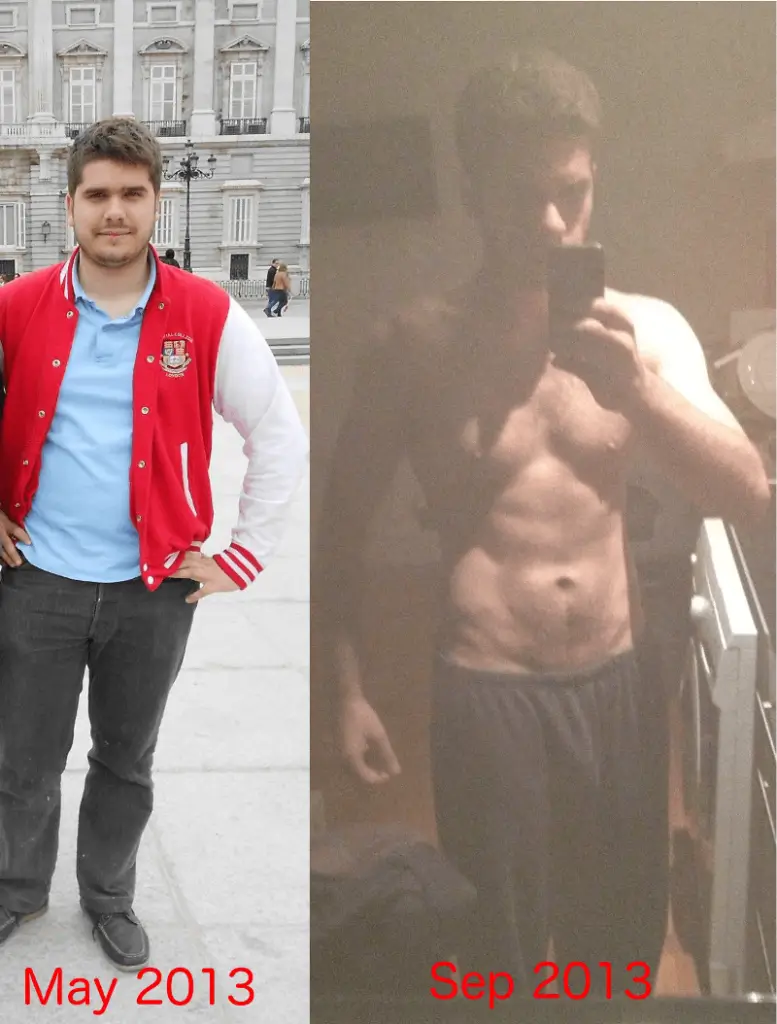
The importance of nutrition and healthy lifestyle
I learnt about nutrition though reading books, and with the help of nutrition and wellness expert Benly Parkinson. She kept me accountable and helped me make better food choices. Don’t underestimate the power of role models.
I mean, I went from struggling to go up one flight of stairs to rowing at Cambridge University within a year. That’s the power of proper nutrition! This experience also ultimately led me to start my business NutriAdmin, providing nutritionist software, personal trainer software, and coach software.

Over time, I tried many habits, kept track of the data, measured effects, made tweaks, etc. Trial and error. My discipline has increased over the years and the number of habits have piled up adding up to the current list.
So why these habits? Because they work (at least for me) and because they have organically grown into my routine and made me who I am today.
Measuring gains to become a productivity machine at work
How can you use the scientific method to improve productivity? It all starts with defining measurements so that we can collect data and make meaningful decisions.
After all, if you want to be a productivity machine, you need to fine-tune and tweak different aspects of your routine and environment.
I have been using the Pomodoro technique at work for a long time. With this technique, I work in 25-minute blocks whilst focusing on a single task, with 5-minute breaks in between.
I personally really like this way of working, especially because it allows me to measure my productivity. The pomodoro becomes a relatively standardised “unit” of work for me this way.
Putting the pomodoro technique into practice
For instance, most people are in the office from 9AM to 5PM, with a lunch break. You may think that’s 8 hours of work, but you would be wrong.
The typical 9-to-5 keeps your physical body for 8 hours in the office, but there is no guarantee that your brain will be at work during that time too! A lot of time can be lost to procrastination.
When I first started using the Pomodoro technique, I found that in most days I would only get about 9 pomodoros of work a day. That’s a measly 3 hours and 45 minutes of focused work in a day!
You may be wondering, where did the rest of the time go? If you have ever procrastinated and are honest with yourself, you know the answer:
- checking phone and social media
- eating snacks
- watching youtube
- chit-chatting with colleagues
- general procrastination and instant gratification distractions
Improving focus and tracking results
To put this in contrast, I have averaged about 17 pomodoros of daily focused work for the last 2 months. That’s a massive, sustained improvement. What could you do at work if you doubled your productivity?
To be precise: I get to the office at 6:30AM and leave by 4PM. I don’t work weekends. That’s 9 and a half hours in the office (with a 30–60 minutes lunch break), so not outrageous hours. About 50 hours of work a week.
When I was younger, I used to work 80–90 hour weeks. I was more energetic perhaps, but far less efficient with my time.
Now I work 50 hour weeks, but I am a productivity machine. I never procrastinate at work, and I get things done. I attribute this discipline and consistency to the habits described in this article.
Would you like to be more productive and focused? Would you like to do more in 50 hours a week than in 80–90 hours of mind-destroying toil?
Also, if you want to practise the Pomodoro Technique virtually with someone, my friend Priscilla hosts sessions on Youtube that you can join for free.
How these habits help me become a productivity machine
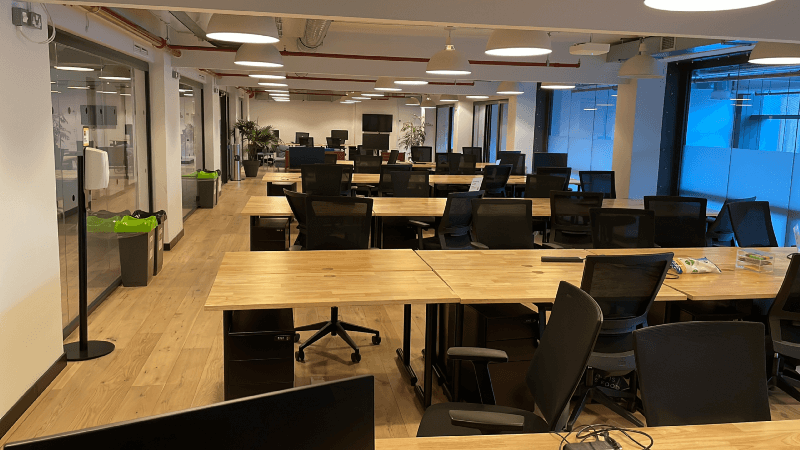
Firstly, let’s talk about dopamine. Dopamine is a hormone that our bodies produce to motivate the brain towards certain behaviours that produce a reward. You can find a better definition online, but let’s roll with this for now.
There have been experiments with mice where their brains were altered to block dopamine. Those poor mice were so unmotivated that they would literally not even move to eat when food was presented to them.
How instant gratification sabotages our efforts
Now, the thing with brains is that they are lazy. Our brains are always looking for the quickest dopamine hit, and they will typically search for our most recent habitual behaviours to accomplish goals.
Marketers know this, which is why instant gratification is the scourge of modern life and so ubiquitous. There is an endless list of products and behaviours easily available nowadays that produce instant gratification:
- junk food, sugary and salty food
- videogames
- TV shows, netflix
- smartphones, social media, youtube
- drugs, smoking, alcohol
- etc
So, what is the problem with instant gratification? If we train our brains to habitually seek quick dopamine, then effortful tasks that yield long-term benefits become incredibly dreadful.
Observing yourself to learn and improve your willpower
Pay attention to yourself. When do you seek any of the instant gratification behaviours above? For most people, this happens daily at work, especially when faced with a challenging task.
Things like exercise, reading a book, meditation, working on priorities (not busywork), and eating healthily all produce immense long-term results when done consistently — but they require work.
Delayed gratification has been shown to be a predictor of success in life. You can read about the Marshmallow experiment to learn more. Delayed is the opposite of instant gratification.
What I have found is that, after completely eradicating all sources of instant gratification in my life, the wholesome, delayed-gratification activities like work, reading, and exercise become exceedingly appealing.
My brain wants dopamine and endorphins/serotonin, like everyone else’s. I just have trained it to only be able to acquire it through creative work, exercise, reading, eating healthy meals, sleeping, etc.
Would you like to literally crave behaviours that are good for you long-term? How could your life improve if you desired healthy food instead of junk every time you got hungry?
More specifics on habits and resources to fine-tune the productivity machine
So why do I do some of the seemingly odd behaviours listed in my routine? Here is a breakdown of the rationale for each.
Waking up at 5AM
It allows me to receive more sunlight (Vitamin D), to never be in a rush, and to control my day in a consistent way. It trains my willpower. I get to the office first and can focus on my most important task without distractions
Writing goals every morning and night
It trains my subconscious to be always thinking of what I want. It acts as a guiding light. Essentially, I am brainwashing myself daily into wanting wealth, health, great relationships, and happiness.
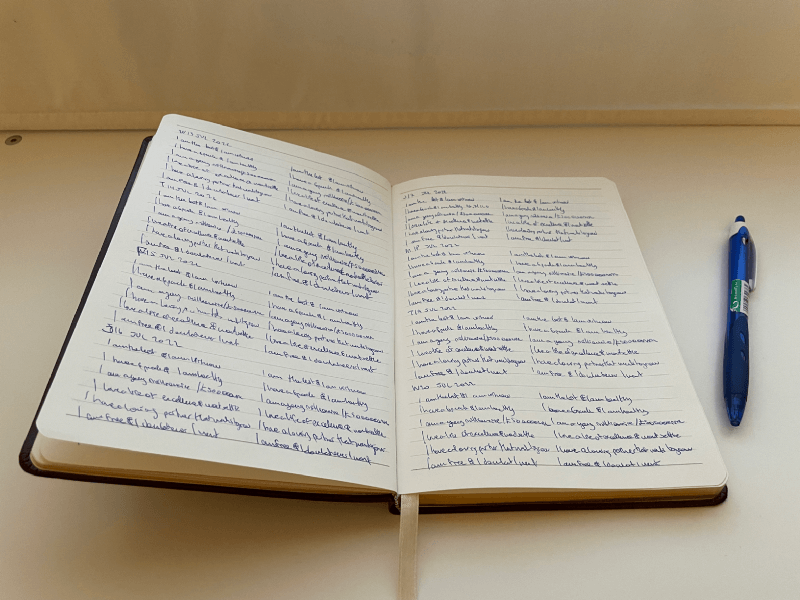
Drinking cold water
Upon waking up is when we are most dehydrated. Drinking water here is a great idea. Not as important as my goals though, that’s why goals are always written first thing upon awakening.
Morning daily exercise
Wakes me up, removes cortisol from bloodstream, keeps me fit, makes me feel accomplished before most people have even woken up
Morning daily yoga
I hope I will never have back pain with this. Back pain cripples most middle-aged adults sooner or later. This makes me feel young and pain-free.
Morning meditation
By focusing for 10 minutes on my breath I have grown to develop incredible discipline and focus. It’s so boring to focus on the breath! After this, doing work like programming feels like effortless fun by comparison.
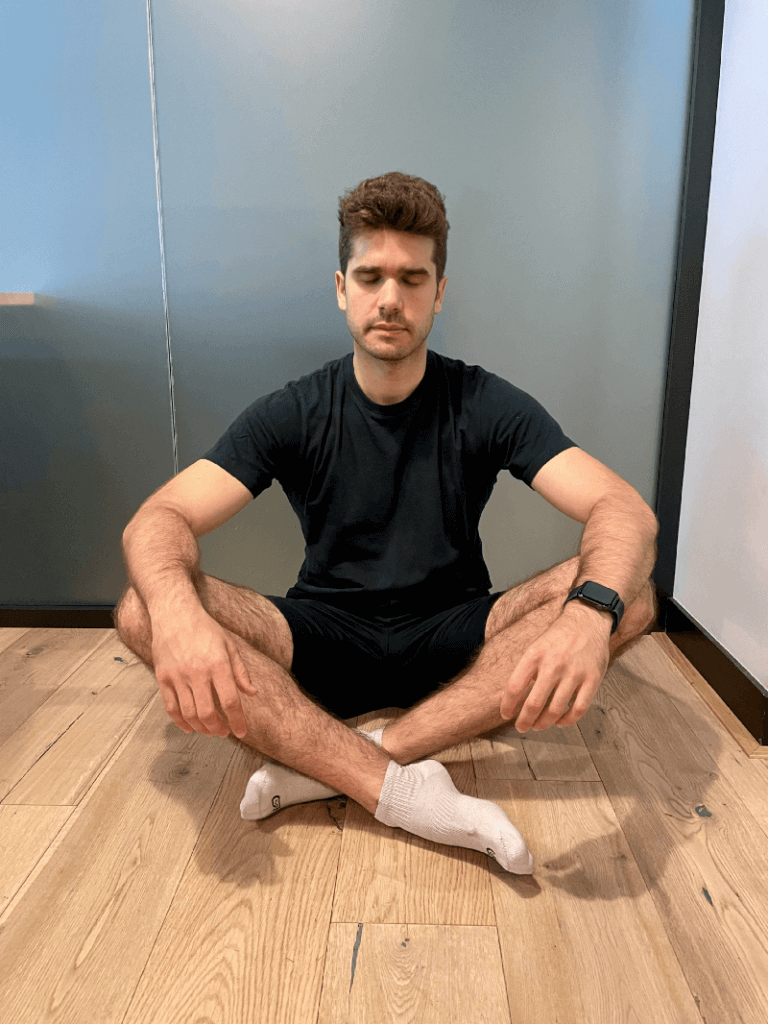
Morning gratitude journaling
This trains me to be positive and to look at the good side of things. I never complain, which tends to draw more positive people and relationships into my life. I’m not the only person advocating for this daily practice.
Cold shower
This boosts my immune system (last time I was sick in bed was about 9 years ago btw, when I was fat and unhealthy). It also wakes me up and makes me feel euphoric, like a coffee rush without the coffee
Breakfast
I normally prepare myself a shake with:
- 400ml organic full fat milk
- Spices: vanilla, ginger, turmeric, cinnamon, turmeric
- Organic cacao powder
- A blend of greens, including spirulina, kale, and others
- Whey protein
- Almond butter
- A shot of decaf coffee
This takes 2 minutes to prepare, is delicious, and contains a million natural nutrients.
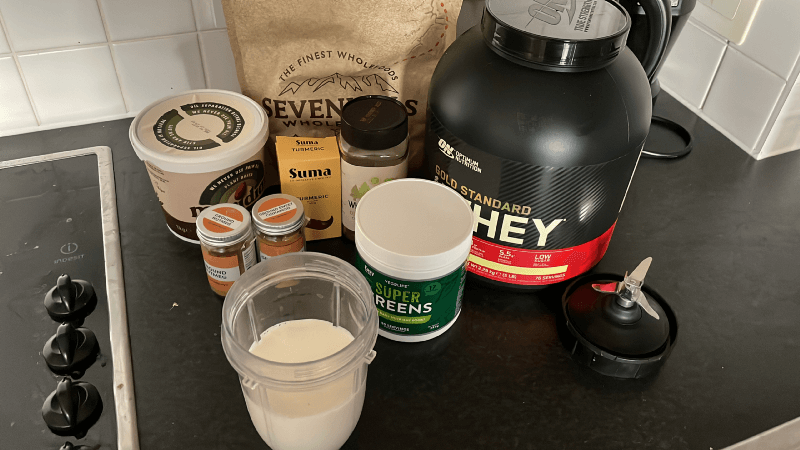
Phone after my routine
I will check my phone for messages just briefly after I have done my whole routine. It’s like a mini-reward. If I did this before the difficult bits like exercise, I wouldn’t get the routine done consistently
Evening early dinner
The digestive system heavily influences our circadian rhythm. Having dinner at 5PM tells my body by 9PM that it is time to sleep. Eating before bed will prevent you from optimal sleep
No screens before bed
This ensures I read instead, which is more useful. It also ensures I consistently sleep by 9PM, and my sleep quality is increased. Videogames, social media, or TV will make you sleep later and worse
Writing goals immediately before sleeping
I want to dream about my goals; I want to think about them as I go to sleep; I want to be consumed by them. That’s why I write them daily. My subconscious will produce better ideas towards my goals with this practice.
Want more details? At the end of the article I link to some further reference on tools, additional reading, and resources.
Things I do not do
I don’t take nootropics, drugs, medicines, supplements, or anything artificial and too novel to have been accurately tested. I get all my nutrients from natural, time-tested sources. The Lindy Effect guides my decisions.
Nor do I seek shortcuts or promises of top health from dubious sources. I have only achieved great results with effortful practice. It is my belief that there are rarely any instant solutions to complex problems in life.
I do not pontificate on my lifestyle and try to convince others to switch their ways. Everyone has the freedom to live their life the way they want. I am sharing here how I do things in case you find it useful, but you are free.
The controversy with caffeine
Controversially, I haven’t drunk caffeine for a year and I have seen my productivity soar. I have changed many other variables, so the gains may be due to other habits. I am still experimenting here.
The problem with caffeine is that it messes up with sleep. Even if you fall asleep, you will experience less deep sleep and be more likely to wake up at night with coffee.
Sleep is crucial for a healthy lifestyle and to consistently be a productivity machine. It’s so crucial in fact, that I am willing to sacrifice coffee to ensure I always get perfect sleep.
Now the above said, I have recently started experimenting with a single, weak espresso shot early in the morning. My hope is that with this small dose I can get benefits like enhanced focus without the side effects.
Health and happiness
You may be thinking, good for you, but doesn’t this lifestyle make you a monk? Where is the fun in such a clean life? Do you have any life?
Fair point. My lifestyle is my own, it’s not necessarily best for you.
However, I wish to clarify one point. I used to do all these things I have listed that I don’t do anymore, like eating junk food, sweets, playing videogames, binging on TV shows, etc.
The reason I don’t engage in negative habits anymore is because I do not crave these habits anymore. I don’t want them, they are unappealing now.
How my appetite has changed
For instance, when I was fat, I was addicted to McDonald’s. Several times per week my brain would compel me to gulf down a Big Mac meal (or two).
Nowadays, when I am hungry, my brain compels me to eat a healthy meal. I have successfully trained my brain to crave healthy foods. I am hungry less often overall.
This is similar to how cigarettes are irresistible for smokers, but non-smokers are indifferent (or even repelled) by the same stimulus.
Finding better sources of fulfilment
I don’t feel like I have given up on things I like. I rather have found more fulfilment in alternative — often healthier — ways and habits of obtaining similar rewards.
For instance, I really enjoy playing badminton with my partner, going for walks and listening to audiobooks, drawing, reading in bed, cooking, meeting friends, cycling, etc as leisure activities.
I crave the above leisure when in the past I would be more likely to crave things like videogames, youtube, social media, and other instant gratification activities in my free time.
Life is not just work, and I find that, with my hyper-productive work schedule, I get so much done in 50 hours a week that then I have loads of free time to enjoy relationships, leisure, rest, and fun.
The importance of flexibility and adaptation over time
Also, I don’t feel like my habits are rigid. It feels the opposite! I feel I have so much freedom because many of my daily tasks are sort of automated, which liberates willpower for creative work and other pursuits.
So rather than being a slave to a rigid routine, I find I have entirely free and meaningful moments outside of work where I can do whatever I want without worries. I am also financially, mentally, and physically free.
I find I achieve flow (read the eponymous book by Mihaly Csikszentmihalyi to learn more) consistently during work, which has been shown in studies to increase overall happiness and life satisfaction.
You will only be able to be a productivity machine at work when motivated and driven. Do things that excite you. I’d dare suggest — invest time developing your skills and career so that you get to do more of what you enjoy!
Ultimately, I believe that better health, more meaningful and productive work, great relationships… all these things synergise and lead to a more fulfilling and happy life! At least I feel this has been the case for me.
Relaxation and rest
Back in early May 2022 I was averaging a sub-optimal 9–10 pomodoros a day. This was after 4 months of intense work since the Christmas holidays.
I then took a one week holiday and visited New York on my own. During this trip, I didn’t do any work, and I had time to reflect on my goals and habits.
It was only after I returned that I noticed a massive increase in my productivity. I’ve been averaging 17 pomodoros of focused work a day since then, and it’s July 2022 now.
What this means, is that this trip was literally positive ROI for work. I.e. 1 week of lost work equated 50 pomodoros at a 10-pomodoro/day pre-trip rate.
The excess 7 extra pomodoros/day in increased productivity meant it took less than 2 weeks to exceed lost work. This is not even taking into account the fun, relaxation, and other hard to quantify positive effects of a holiday!
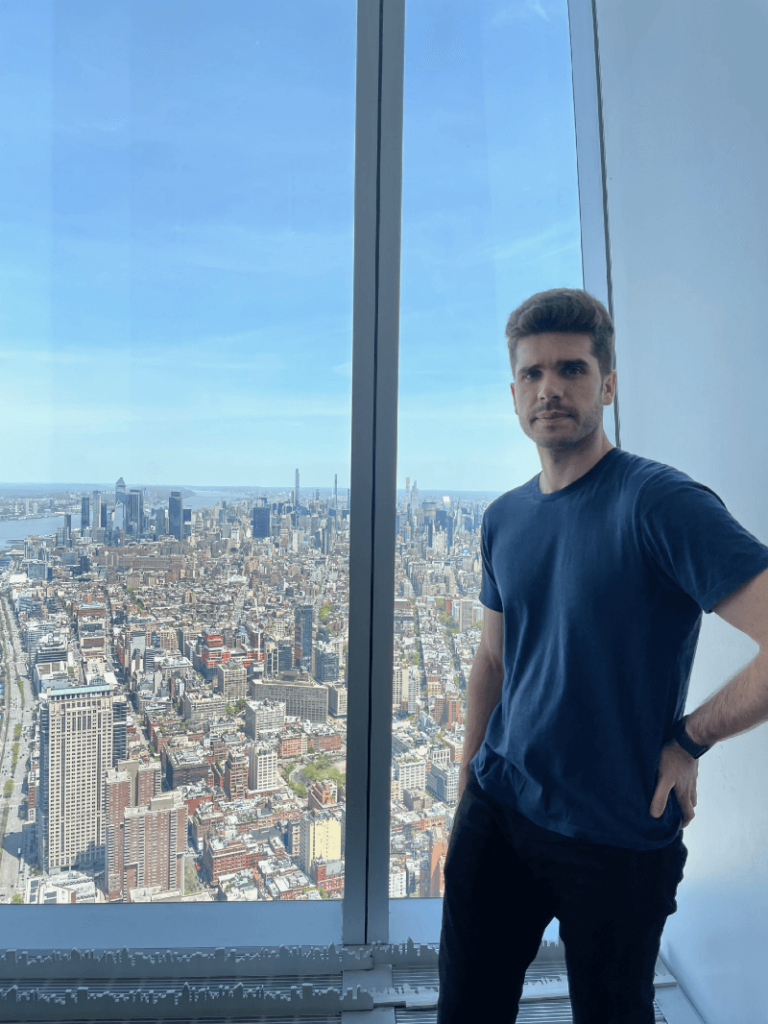
Using holidays strategically
So, in my case, I feel I need strategic rest to be an optimal productivity machine. I’ve narrowed it down to these time-scales:
- 5-minute breaks after every 25-minute work block
- Great 8 hours of sleep per night
- 2 days rest (weekend) for every 5 days of work (week)
- A 4–7 day holiday every 3–4 months, or whenever I notice productivity going down
You may need something different in your case, but the rest periods above seem to work great for me. I keep on measuring my productivity and making tweaks as necessary, and you could do the same if desired.
To learn more about the importance of rest, I recommend Rest, by Alex Soojung-Kim Pang.
Benefits of holidays for productivity
On another note, a crucial component of trips is that:
- A holiday in a new place breaks habits and common patterns
- Our brains get different input/stimulus than what we are used to when being in a new environment
- We are more likely to be exposed to new ideas and experiences
I believe the above may foster creativity. It can also lead to looking at things from a different angle.
Example of a lifestyle change derived from a holiday
For instance, in my case, I had the following thought during my trip:
Right now, I am spending my time working, meeting friends, talking to family, with my partner, exercising, sleeping, and… doing tango.
Yes, I spent around 9 months between 2021–2022 dancing tango at a school. It’s a lot of fun, a great way to make friends, keep active, and to relax. It can be a great hobby to have.
The thing with tango is that it is really time-intensive. I was doing about 3–4 weekly sessions of 3 hours (plus transportation time) at the time. So this took a lot of my time.
Since I was in the habit of going to tango class after work, I didn’t think much about it during January-April 2022 on my daily life. I was too busy with my routine to notice the routine itself.
But once I was on holiday, it quickly became obvious that, out of the things I spent time on, and cared about (work, family, partner, friends, exercise, sleep, tango), tango was the least important for me.
I figured, if I drop tango, I will get to spend more time on the other things that matter to me most. I felt I was trying to do too many things at once. For instance, I was meeting some friends monthly when we used to meet weekly.
Turns out, dropping tango was the right decision for me. This improved my sleep (tango is usually late at night), and it allowed me to spend more time with friends/family/partner, and more time working and exercising.
This was a hard decision since I really enjoyed the tango people, and it was a very enjoyable and healthy activity. But ultimately, the opportunity cost was too high.
I think it would have taken much longer for me to come to this realisation had I not taken the trip. Similarly, people going on trips often come to epiphanies, like switching jobs/careers, moving to a new city, etc.
Take time to rest, if you want to perform at your best at work.
Conclusion
Hope you have found my list useful, curious, or insightful.
If you are a young person and are interested in some of these habits, don’t feel overwhelmed or think you have to do them all at once. It has taken me years to develop them! You won’t be able to do something like this in a day!
Don’t just copy my list either. This list is the result of loads of experimentation. I have tried many habits that didn’t work for me (but that may work for other people). We are all unique individuals.
I encourage everyone to test things out. Try meditation for a week or two, try cold showers, read more books, see what you enjoy and what sticks! Don’t be afraid to switch things around.
Some habits are hard at first — like cold showers. In my case, this was pure hellish pain for a week, but as my body has adapted I find them really enjoyable now! Undoubtedly, The best part is talking about this at parties.
Don’t try to be perfect and consider trade-offs
Also, I may occasionally miss an exercise session, or be a bit less productive some days. For instance, it was quite hard to sleep during the recent heat wave in London (40 degrees Celsius on 19 Jul 2022, a record!).
Keeping a 5AM-9PM schedule will affect social life too. I schedule meeting with friends as much as possible within this window and only make exceptions and stay up late when it’s a special occasion.
I don’t beat myself up when a day is not perfect. The goal is to be as close to perfection as possible, whilst realising perfection itself is unattainable. As long as I am improving over time I am happy. I want to achieve my potential.
Thank you for reading. If you want to learn more about how I started my business without investor funding, I recommend this article I wrote a while ago.
Tips for nutrition professionals
On the other hand, if you are a nutritionist, dietitian, or work in wellness, check out other productivity articles at the NutriAdmin Blog.
You can also follow me or reach out to me on LinkedIn. I only accept connection requests from people working in nutrition/fitness, so please don’t be offended if I reject yours. That being said, I am happy to chat with anyone.
Finally, feel free to write some comments below. Do you have any questions about the article? Have you found it interesting? Do you vehemently disagree with any of my claims? I welcome discussion!
Wish you a happy, productive, and fulfilling life.
PS.: It took me 10 pomodoros (4 hours and 10 minutes) to write this article (over 5200 words) and I finished before lunch. Previously it would have taken me at least twice as much to accomplish the same task.
Further reference
Below, I will list further resources to learn more. You can skip this on a first read and refer to it later as reference when needed. I don’t get any commissions from any of these products, they are just some of my favourites
- To learn about habits, read The Power of Habit, by Charles Duhigg
- To learn about meditation, and how it can improve your focus, a starter point can be Mindfulness: A practical guide to finding peace in a frantic world, by Prof. Mark Williams and Dr. Danny Penman
- To practice meditation, Headspace can be a useful app until you learn to do it on your own
- To learn about setting and achieving great goals, read The 10x Rule, by Grant Cardone
- To cheaply and efficiently learn from books, I recommend Audible
- To learn about nutrition, read as much as you can in the topic. A good starting point is Why we get fat by Gary Taubes
- Whilst you are at it, I also recommend reading the whole Nassim Taleb bibliography. It’s just excellent. Start with The Black Swan
- Regarding cold showers, check out The Wim Hof method, by Wim Hof
- For daily Yoga, I use an app called Down Dog. You can also use free Youtube videos
- The 5AM club, by Robin Sharma, got me to try waking up at 5AM. I have found this practice invaluable.
- Read Why we sleep, by Matthew Walker to learn about the crucial role of sleep in cognitive performance and wellness
- Neurolinguistic Programming (NLP) and anchoring, by Tony Wright. I met Tony at the Health Optimisation Summit and his podcast explains the concept very nicely. This is one of the reasons why association works and why I control my environment – i.e. office for work and home for relaxation.
- If you want to start a software business like I have done, I recommend you read Start Small, Stay Small, by Rob Walling and that you watch Designing the Ideal Bootstrapped Business with Jason Cohen. These two resources have changed my life!
- To develop more motivation and a burning desire to achieve your goals, read Think and Grow Rich by Napoleon Hill. You will have to read it three times to really understand what it is about.
